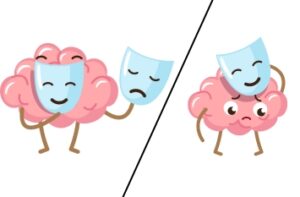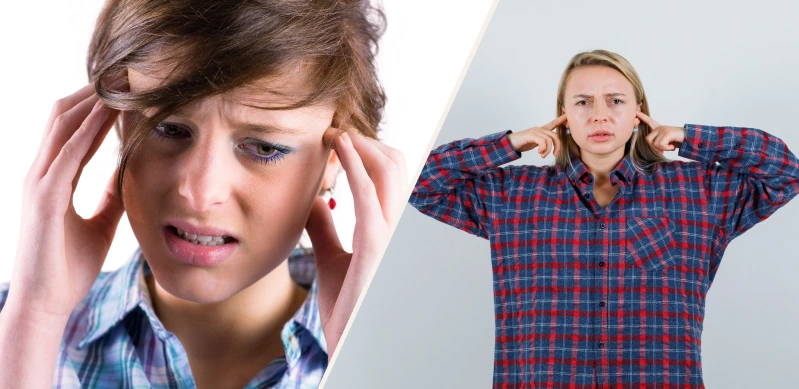
Bipolar Disorder Explained: From Highs to Lows and Everything In Between
Bipolar Disorder Explained: From Highs to Lows and Everything In Between We all experience emotional highs and lows, but for individuals living with bipolar disorder,

Have you ever experienced the sensation of hearing voices in your head? You are not alone. This phenomenon, known as auditory hallucinations, can be perplexing and even frightening for those who encounter it. While it’s easy to jump to conclusions or feel alarmed, understanding the science behind why we hear voices in our heads can shed light on this intriguing aspect of human cognition.
Research suggests that auditory hallucinations can occur for a variety of reasons, ranging from mental health conditions such as schizophrenia to stress, trauma, or even sleep deprivation. By exploring what experts have uncovered, we can gain valuable insights into this fascinating aspect of the human mind. Let’s explore further to demystify the experience of hearing voices in our heads.
Auditory hallucinations refer to the perception of sound when no external source is present. These hallucinations can manifest as voices, music, or other sounds that seem to originate within the mind.
While the term “hallucination” often conjures images of vivid visual experiences, auditory hallucinations are equally significant and can have a profound impact on an individual’s perception of reality. Understanding the nature of auditory hallucinations involves exploring the intricacies of auditory perception and how the brain processes sound stimuli.
By examining the characteristics and manifestations of auditory hallucinations, we can gain a deeper insight into the complexities of human perception and cognition.
Auditory hallucinations can manifest in various forms, each presenting its unique characteristics and implications. Here are some common types of voices that individuals may experience:
Commanding Voices: These voices instruct or command the individual to perform specific actions, often with a sense of urgency or authority.
Critical Voices: Critical voices involve internal commentary or criticism directed towards the individual, often focusing on their actions, thoughts, or self-worth.
Conversational Voices: Some individuals experience auditory hallucinations resembling conversations between multiple voices, which may engage in dialogue with each other or with the individual.
Familiar Voices: In some cases, the voices heard may be familiar to the individual, such as the voices of family members, friends, or acquaintances.
Unfamiliar Voices: Conversely, individuals may also hear the voices of strangers or entities unknown to them, adding to the sense of confusion and disorientation.
Understanding the causes of auditory hallucinations is crucial for unraveling the mystery behind why individuals hear voices in their heads. Various factors can contribute to the occurrence of auditory hallucinations, ranging from mental health conditions to physiological imbalances.
Individuals diagnosed with schizophrenia spectrum disorders are particularly prone to experiencing auditory hallucinations. These disorders, characterized by disturbances in thought processes, perception, and behavior, can manifest in auditory hallucinations as one of their primary symptoms.
The exact mechanisms underlying auditory hallucinations in schizophrenia are complex and multifaceted, involving disruptions in neurotransmitter function and structural abnormalities in the brain.
Sleep disorders such as insomnia, sleep apnea, or narcolepsy can disrupt normal sleep patterns and lead to alterations in brain activity. These disturbances in sleep architecture may predispose individuals to experiencing auditory hallucinations, particularly during periods of wakefulness or rapid eye movement (REM) sleep.
Sleep-related hallucinations often involve vivid auditory experiences that blur the line between dreams and wakefulness, contributing to the phenomenon of hearing voices in one’s head.
Post-traumatic stress disorder (PTSD) can trigger a range of psychological symptoms, including auditory hallucinations. Traumatic experiences, such as combat exposure, physical assault, or childhood trauma, can profoundly impact the way the brain processes sensory information, leading to intrusive auditory memories or flashbacks.
Individuals with PTSD may hear voices associated with traumatic events, amplifying their distress and exacerbating their symptoms.
Disorders affecting the brain and nervous system, such as epilepsy, Parkinson’s disease, or brain tumors, can disrupt neural pathways involved in auditory processing. Structural abnormalities or aberrant electrical activity in specific brain regions may give rise to auditory hallucinations as a secondary symptom of these conditions.
Understanding the underlying neurobiological mechanisms can aid in the development of targeted interventions for managing auditory hallucinations in individuals with neurological disorders.
Beyond schizophrenia and PTSD, other mental health conditions can also contribute to the occurrence of auditory hallucinations. Conditions such as bipolar disorder, major depressive disorder, or dissociative disorders may present with auditory hallucinations as part of their clinical picture.
These hallucinations may reflect underlying mood disturbances, cognitive distortions, or dissociative states, highlighting the diverse array of factors that can influence auditory perception.
In some cases, nutritional deficiencies, particularly deficiencies in vitamin B12 or folate, may play a role in the development of auditory hallucinations. These essential vitamins are involved in neurotransmitter synthesis and neural function, and their inadequate levels can disrupt normal brain processes.
Supplementing with vitamin B12 or folate may alleviate auditory hallucinations in individuals with documented deficiencies, underscoring the importance of addressing nutritional factors in mental health management.
When it comes to managing auditory hallucinations, a combination of therapy and medication often forms the cornerstone of treatment. Here are some approaches that individuals can explore to help stop voices in their heads:
Medication: Antipsychotic medications are commonly prescribed to reduce the frequency and intensity of auditory hallucinations in conditions such as schizophrenia. These medications work by modulating neurotransmitter activity in the brain, helping to alleviate symptoms and restore mental well-being.
Therapy: Various forms of psychotherapy, such as cognitive-behavioral therapy (CBT) or supportive therapy, can help individuals learn coping strategies to deal with auditory hallucinations. CBT techniques may involve challenging distorted beliefs about the voices or developing mindfulness skills to reduce distress.
While medication can be effective in managing auditory hallucinations, some individuals may prefer non-pharmacological approaches or wish to explore complementary therapies.
Here are some strategies for stopping voices in your head without relying on medication:
Therapeutic Techniques: Engaging in relaxation techniques such as deep breathing, progressive muscle relaxation, or meditation can help calm the mind and reduce the intensity of auditory hallucinations.
Mindfulness Practices: Practicing mindfulness involves being present in the moment and observing thoughts and sensations without judgment. Mindfulness-based interventions can help individuals develop greater awareness and acceptance of their experiences, including auditory hallucinations.
Support Groups: Connecting with others who have similar experiences can provide validation, empathy, and practical advice for coping with auditory hallucinations. Joining support groups or peer-led initiatives can foster a sense of community and reduce feelings of isolation.
Lifestyle Modifications: Adopting a healthy lifestyle that includes regular exercise, adequate sleep, a nutritious diet, and stress management techniques can contribute to overall well-being and may help reduce the frequency of auditory hallucinations.
The question “Why do I hear voices in my head?” encompasses a range of factors, from mental health conditions to sleep disorders and neurological abnormalities. By understanding these causes and implementing appropriate interventions, individuals can take proactive steps toward managing auditory hallucinations and improving their overall well-being.

Bipolar Disorder Explained: From Highs to Lows and Everything In Between We all experience emotional highs and lows, but for individuals living with bipolar disorder,
